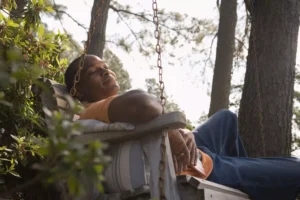I’ve been thinking about training for a marathon. I thought about it this morning as I reached for a second Krispy Kreme donut. I like to think about crossing the finish line. I just don’t like thinking about what it would take to cross the finish line.
I do know a friend who ran a marathon. I asked her what went through her mind the moment she finished. Did she feel euphoric? Did she feel like she could do anything? Did she feel like Wonder Woman without the outfit? She said her main thought at that very moment was that she needed to use the bathroom.
Then she told me the euphoria really set in the next morning. As did muscle fatigue. I’m calling it “fatigue,” however she would call it total muscle shut down. She said she could barely walk … until she accidentally discovered that walking backward was much easier than walking forward. I pictured her hobbling backward in the grocery store and wondered what people must have thought. She told me that walking backward must have used different muscles, because it wasn’t as painful as going forward.
It reminded me of a recent sermon I heard at church. In it, my pastor said there are some people in life who walk backward into the future. They’re more focused on the past — what they did wrong, who failed them, and how they’ve been hurt — he said, than on where they’re headed and where God wants to take them through it all.
I wondered if these people thought that turning around to face the future would be too painful. That because they’ve been disappointed in the past, they fear having hope for the future.
I love what Pope John XXIII said about this,
Consult not your fears but your hopes and your dreams. Think not about your frustrations, but about your unfulfilled potential. Concern yourself not with what you tried and failed in, but with what it is still possible for you to do.
In my own life, I think about the hurts I’ve experienced in the past and have come to believe it’s more painful to walk backward into the future than to face it. My father was — and still is — an alcoholic. It has caused a lot of pain for my family and has wounded me in many ways. But it’s amazing how God can heal. A psychologist would label me as an adult child of an alcoholic, but I simply call myself a child of God. I learned that an important part of my healing included facing those hurts, but it was equally important to turn away from them at the right time with God’s help. It’s not that I am ignoring my wounds. Just the opposite: I am acknowledging my brokenness. Through it, I have realized how God wants to use those wounds for redemptive purposes in my life.
All of us have experienced disappointments, hurts and pain. Some of it was out of our control. But what about the pain we’ve experienced that was in our control? What do we do with past sins that we can’t seem to let go of? When we’ve asked for forgiveness but can’t seem to accept it and move forward?
Again, my pastor answers this question powerfully. He says,
Most of us live in regret. But regret is not brokenness — it’s just another form of pride. It’s saying ‘I wish I hadn’t done it.’ God doesn’t care what you’ve done if you’re only going to live the rest of your life in regret. He cares that you let what you’ve done in your life break you. Because until you realize you are broken, you can’t experience redemption.
I know there are times when I’ve asked for forgiveness for a sin … but I’ve held on to a little self-loathing about the matter, just for good measure. You know, just in case Christ’s death wasn’t good enough. Just in case His blood didn’t cover all of my sin.
But true repentance is not just regretting what we’ve done. Or hating yourself for it. And it doesn’t end at having your heart broken with remorse over sin. It requires turning from the sin and handing over our broken hearts to Christ. It means turning around, walking forward and looking ahead to where God wants to take you.
But it’s easy to look away. I think about the time when the disciples were in the boat with Jesus and how the storm came after He fell asleep. As the storm raged, the disciples took their eyes off Christ and fear instantly filled their hearts. Can you blame them? I picture angry waves smashing into the sides of the boat. Lightning bolting into the water. Dark clouds thundering and making their hearts pound even faster.
And I wonder, How could Jesus sleep through something like that? It’s as puzzling to me as how my husband could sleep through our colicky baby’s waking fits. I imagine many of us have wondered this at some point. When storms come into our lives, when we’re standing in the boat, and the waves are crashing all around, it’s easy for us say to Jesus, “Do You see what I’m going through? Don’t You care? Help me, Lord! I’m scared.”
And Jesus always says, “Turn and face Me.” He’s not panicked about the storm. He’s not panicked that you don’t have a clue what you’re going to do after you graduate. He’s not worried that you’re struggling financially. He is not alarmed that you are feeling alone and wonder if you’ll ever get married. He is saying, “Turn and face Me. Trust in Me and have faith that I will calm the storm and make a way.”
For some of us, looking backward is all we know. It’s like the man in the Bible who was lying next to the Bethesda pool waiting for healing. He had been invalid for 38 years. When Jesus saw him, He asked him, “Do you want to get well?”
Part of me wonders if the man really wanted to reply, “Uh … duh. Hello? I’ve been ill for 38 years. Do You think I’m lying next to this pool for the fun of it?” Yet Jesus knew exactly how long the man had been sick. He knew how long he had been waiting to be healed. And still, Jesus still asked the man, “Do you want to get well?” For those of you who are focused on your past and are hurting, Christ is also asking you, “Do you want to get well?” Turn and face Him. He will begin a healing in you if you pick up your mat and walk toward Him.
When we’re walking backward into the future — when we’re focused on the stormy circumstances of our lives — we miss all that God has for us in the present. The Christian life isn’t about getting beamed to heaven. It’s about living, struggling and learning to love God more every day. He wants to show us His redemption and His goodness in the midst of the journey — in the midst of a storm. He wants to give us joy for the present and hope for the future.
The good news is God can help us turn around. We just need to look where we’re going. But that doesn’t mean focusing on our circumstances or putting our hope in our future success. We’ve got to remember that where we’re “going” is toward Christ. That means putting our hope in the Lord himself. And that kind of hope does not disappoint.
Copyright 2005 Kara Schwab. All rights reserved.









